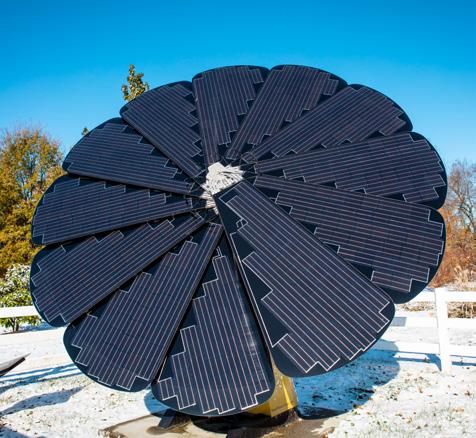
3 minute read
ENERGY CONSCIOUSNESS LEADS TO POSITIVE IMPACT
Several businesses in Owensboro have led the way in energy management.
In today’s society, consumers are paying close attention to every move companies, businesses and brands make. Affecting the environment in a positive way has more confident responses from consumers than businesses that aren’t as environmentally responsible.
Locally, Owensboro has paved the way with some of its eco-friendly businesses. At the Western Kentucky Botanical Garden, they have a 16-foot tall “smart flower” that helps power its facilities.
After funding was made by possible Charles D. Ralph Estate and the Charles Mason Ralph Fund at the Community Foundation of Louisville, The Garden pursued a solar initiative to help power both the education building
LEFT: THE WESTERN KENTUCKY BOTANICAL GARDEN’S 16-FOOT SMARTFLOWER USES CLEAN, SOLAR ENERGY TO HELP POWER ITS FACILITIES. B E LO W : H A M P TO N I N N & S U I T ES D O W N TO W N O W E N S B O R O / WAT E R F R O N T I S T H E F I R S T L E E D - C E RT I F I E D H OT E L O F I TS K I N D I N K E N T U C K Y A N D T H E F I R S T HOTEL IN THE UNITED STATES TO UTILIZE GEOTHERMAL INSTALLATION IN PIPINGS.

and the cottage, which make up approximately 97 percent of the total energy used at The Garden.
WKBG Director Susie Tyler said the Smartflower is a milestone. “Our Smartflower represents a strong stand for conservation and education,” she said. “It is a first, but not the last, solar initiative for The Garden.”
The Smartflower is a fully integrated, all-in-one solar system that produces clean energy. Power harnessed by the Smartflower will augment electricity needs in The Garden’s Educational Classroom and its production will be tracked by a nearby monitor. As the sun rises in the morning, Smartflower automatically unfolds, directs its solar modular fan toward the sun, and begins harnessing electricity.
The Garden’s Smartflower is the first purchased in the state of Kentucky. Casey Electric LLC of Tell City, Ind., is the Indiana/Kentucky Smartflower distributor and installer.
Hampton Inn & Suites Downtown Owensboro/ Waterfront is a $20 million LEED-certified hotel -- the first of its kind in Kentucky. LEED is the U.S. Green Building Council's acronym for Leadership in Energy and Environmental Design.
The hotel is totally geothermal and includes eco-friendly



features such as car charging stations and cold-water washing as well as amenities such as a full-service steak and seafood restaurant, boutique, and indoor and outdoor swimming pools.
Sharon NeSmith, general manager, said the Hampton Inn & Suites-Downtown Waterfront is also the first hotel in the United States that utilized geothermal installation in pipings.
“Geothermal works by inserting a series of pipes into the ground that circulates water, allowing heat to be transferred to and from the building,” she said. “In this process, heat is not created, it is transported, therefore no fuel is burned. The temperature below ground is a constant 55 degrees, warmer than the outside air in the winter and cooler in the summer. The hotel has 198 wells drilled to a depth of more than 550 feet to access Earth's best heating and cooling system—geothermal power created by the Earth's crust.”
NeSmith said several areas of the hotel roof are covered with soil and plants, making it a green roof that conserves energy and keeps stormwater out of the drainage system. The hotel's pool and spa are heated by solar power. LEED-certified buildings utilize features that use less water and energy and reduce greenhouse gas emissions.
“Malcolm Bryant wanted to build a hotel that was sustainable, and the hotel continues its sustainability practices by purchasing recycled and green cleaning products and focuses on environmental issues, such as energy usage,” NeSmith said. “Activities that reduce contributions to greenhouse gas, increase energy efficiency ratings, and conserve water usage, whether by a single individual or by a large corporation, insure there is energy, air and water for our future generations. We are all responsible for committing to efforts to conserve resources.”











